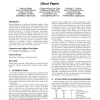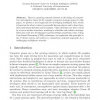98 search results - page 3 / 20 » Using iterated reasoning to predict opponent strategies |
ACSC
2004
IEEE
13 years 9 months ago
2004
IEEE
Table 1 shows the payoff to player one. The same matrix also holds for player two. Player one can gain the maximum 5 points (T = 5) by defection if player two cooperates. However,...
ATAL
2008
Springer
13 years 7 months ago
2008
Springer
Reward shaping is a well-known technique applied to help reinforcement-learning agents converge more quickly to nearoptimal behavior. In this paper, we introduce social reward sha...
CEAS
2005
Springer
13 years 11 months ago
2005
Springer
We discuss how the interaction between spam senders and e-mail users can be modelled as a two-player adversary game. We show how the resulting model can be used to predict the str...
EVOW
2010
Springer
13 years 3 months ago
2010
Springer
The emergence of Grim Trigger as the dominant strategy in the Iterated Prisoner Dilemma (IPD) on a square lattice is investigated for players with finite memory, using three differ...
KI
2008
Springer
13 years 5 months ago
2008
Springer
Abstract. There is a growing research interest in the design of competitive and adaptive Game AI for complex computer strategy games. In this paper, we present a novel approach for...


